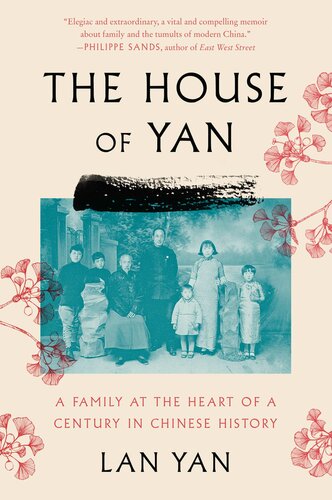
The House of Yan
A Family at the Heart of a Century in Chinese History
کتاب های مرتبط
- اطلاعات
- نقد و بررسی
- دیدگاه کاربران
نقد و بررسی

October 15, 2019
A powerful memoir of the Cultural Revolution and its aftermath by pioneering investment banker Lan Yan. The author opens with a scene in which eight security officers surround her grandfather. "I am crying," she recounts, "because I am not used to all this yelling, all these staircase stampedes, all this banging on doors." With this dramatic opening, the author describes the arrest of her grandfather in the early years of the Cultural Revolution. It did him no good to insist on seeing an arrest warrant, because there was none: Under the revolution's explosion of seething populism, the country was no longer a state ruled by law. Soon Lan Yan and her family were also suspect, tarred by association with a supposed counterrevolutionary who had long been a devoted associate of Mao Zedong. Mao had had disagreements with the Soviet Union a decade earlier over his Hundred Flowers liberalization campaign, which the Soviets feared would open the government to ideological questioning; said one Soviet official, "This is exactly the kind of incitement to bourgeois thinking that we have seen in Hungary!" It didn't help the author's case that it was her father who translated the Soviet official's words into Chinese. After her grandfather was taken away, her father was accused of being a Russian spy. The author, herself interned, graduated from high school but was denied permission to teach, as she had wanted to do: "Their argument was that, since I came from a 'problematic' (i.e., counterrevolutionary) family, they believed that I would have to be reeducated, and that in any case I was not fit to educate others." Allied with Deng Xiaoping, Lan Yan instead emerged as a rising figure in the new era of state capitalism, becoming a partner in a French international law firm that helped open the Chinese market and then heading a bank with a predominantly female leadership, defying the fact that "the world of banking is, just like the legal world, still very misogynistic." A thoughtful, astute narrative that helps Western readers understand the rise of the new China from the ashes of terror.
COPYRIGHT(2019) Kirkus Reviews, ALL RIGHTS RESERVED.

October 28, 2019
The seismic political upheavals of 20th-century China serve as the backdrop to one prominent family’s rise and fall in this comprehensive debut memoir by global banker and international relations attorney Yan. A child of privilege, Yan knew Prime Minister Zhou Enlai and Communist Party Head Deng Xiaoping, but was not exempt from “the toxic mirage of the Cultural Revolution”—the forced indoctrination of schoolchildren and attacks on those perceived to be enemies of the revolution—nor did it cushion her at age 10 when her grandfather and father, both senior civil servants, and her mother, a translator, were arrested for spying in November 1967. The nonlinear narrative then pivots to her family’s origin stories, sometimes confusingly so: grandfather Yan Baohang’s path from swineherd to Edinburgh University student and later spy for the Communist Party; father Mingfu’s crucial role in the Chinese delegation to Khrushchev’s Soviet Union; and mother Keliang, who joined the Central Committee as a liaison to foreign representatives. Yan then affectingly describes her own progression from reeducation camp in rural Henan through the end of the Cultural Revolution in 1977, to her study in Beijing and abroad, and her career in law and finance. Yan expertly captures a tumultuous period in this smart, colorful family history.

Starred review from January 1, 2020
With this debut, investment banker Yan relates her family history from 1895 to 2015. The author's grandfather, Yan Baohang, grew up poor during the final years of the Qing Dynasty (1644-1911). He managed to get an education, enabling him to befriend members of China's elite. He served the Nationalist government of Chiang Kai-Shek in the 1930s, but later joined the Communist Party and was one of the leaders of the People's Republic of China founded in 1949. Yan's father was a Russian language translator for Chairman Mao, and her mother was a diplomat. During the Cultural Revolution (1966-76), her grandfather and father were arrested, and her grandfather died of abuse he suffered under interrogation. At age 11, Yan and her mother were accused of being counterrevolutionaries and were sent to a reeducation camp. After the revolution ended her family was rehabilitated. Now based in France, Yan has her story expertly translated by Sam Taylor. VERDICT A touching, essential account for anyone interested in 20th-century Chinese history and highly recommended for fans of personal family memoir.--Joshua Wallace, Tarleton State Univ. Lib. Stephenville, TX
Copyright 2020 Library Journal, LLC Used with permission.

December 1, 2019
Her grandfather was a communist spy. Her father was Mao's Russian translator. Lan Yan was an expert in international law and head of Lazard's China operations. Due to their roles in politics, Yan's family's story is the story of modern China. Making no assumptions about readers' knowledge of Chinese history, Yan gives plenty of historical context, mostly gleaned from her family's direct experience, such as her father's memories of translating crucial meetings leading up to the Sino-Soviet split. Yan also tells her own story about spending five years with her mother in a reeducation camp before studying international law and fighting sexism in Western firms. Although she details examples for egregious corruption, Yan remains cheerily optimistic about rule of law in contemporary China. Despite her family's ups and downs, she expresses little resentment, spending more pages on law school than on the reeducation camp. The English translation of this originally French work occasionally stumbles in conveying Chinese cultural content, such as calling dim sum ravioli instead of dumplings. Still, this is a deeply personal, accessible, and worthy introduction to modern Chinese history.(Reprinted with permission of Booklist, copyright 2019, American Library Association.)

























دیدگاه کاربران